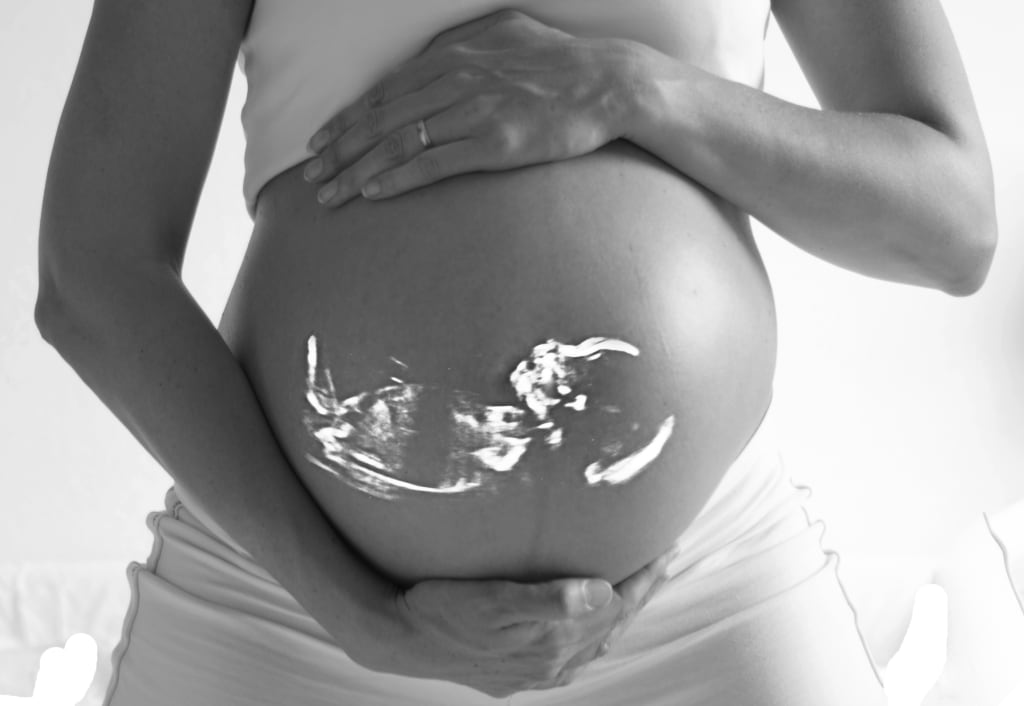Abortion is Not a Women's Right
And in most cases, it's [probably] wrong.

When I told my boyfriend I was pregnant at the age of 19, his first response was that if I wanted to have the child, he would drop out of college and get a job to support us. As shocked and touched as I was (we'd only been "official" for a month), I said "Oh god, no—I'm getting an abortion."
Four years later, I've landed the career of my dreams and have just returned from a fabulous tropical vacation, two things I probably wouldn't have done had I decided not to get an abortion. In actuality, I didn't need to make a decision after seeing that second stripe turn blue—I'd made up my mind a long time ago.
Abortion was a dinner-table topic of conversation in my family, or at least it became one when us kids were deemed old enough to know that I had been conceived "out of wedlock." My parents took every opportunity to tell us that even though our family had started as an accident, the choice to allow that accident (a.k.a. me) the gift of life was a deliberate one. As much as I appreciate this sentiment, even at an early age I was aware of the deep sacrifices both my mom and dad had made, and what felt even worse, of the regrets they seemed to carry with them into parenthood. I knew I was incredibly thankful to be alive, and I also knew I didn't want to end up a teenage mother with a child like me.
My mom gave birth to me because my dad believed that to do otherwise was murder.
To him there was no choice, and he argued for my right to life. By the time I found out I was pregnant, I had researched the bioethics of surrounding controversies, reading reports on subjects from lab-grown embryos to so-called "partial-birth" abortions. I was aware that no human has near definite knowledge of when the aetherial potential for life transforms into its concrete reality, and I was aware that "murder" is a legal term, not a moral one.
There was only one thing research was able to make lucid for me: beyond the basic biological, what exactly it is that is lost during an abortion is ambiguous.
Taber's Medical Dictionary:
abortion
(ă-bor′shŏn)
[L. abortio, premature delivery, miscarriage]
The spontaneous or induced termination of pregnancy before the fetus reaches a viable age...
Concise Medical Dictionary (Oxford):
n. 1. (induced abortion, termination of pregnancy)
the removal of an embryo or fetus from the uterus at a stage of pregnancy when it is deemed incapable of independent survival...
One cynic said to me, "If Schrödinger's cat might be dead, would you shoot it to be sure?"
While this is referentially incorrect (the theoretical cat was simultaneously alive and dead), I've heard the same thought experiment attributed to various authors under a number of names; Schrödinger's Baby, Schrödinger's Fetus, and Schrödinger's Pregnancy; to name a few. The premise of this argument is that the status of a fetus (or embryo, or zygote) as animate or inanimate is presently undeterminable. Whether a fetus at a particular stage qualifies as a living entity or is no more than a non-living "clump of cells" cannot as yet be determined because the complete conditions for life have not yet been discovered. (Whether the difference between "living" and "non-living" is "real," or if it's just another arbitrary line us humans have scratched through our proverbial sand, this argument overlooks.) This stated, it follows that one does not know, when aborting a fetus, if one is not killing it.
Merriam-Webster's Dictionary:
kill transitive verb
\ ˈkil \
1a: to deprive of life : cause the death of
To abort a fetus when one is not certain it is inanimate or dead, goes the argument, it is wrong.
Now, there is one massive assumption backing the conclusion of this argument. That is—killing is wrong. For the sake of simplification in this essay, I will refer to "killing" hereafter to mean the premeditated taking of life from another entity for non-necessary purposes (i.e. excluding medical emergencies) and outside the realm of legal justice. While I will not attempt here to present a logical argument on the ethics of killing—though I hope most readers will agree that, in general, it's not a really great idea—I will raise a few questions.
1. If abortions might kill, why do we induce them?
2. Does the term "abortion" desensitize us to the implications of its practice?
3. Because fetuses cannot speak, do we ignore their potential victim status?
There is another assumption backing the premise of this argument. That is—a fetus is not part of its mother's body. Living or non-living, it is an entity that is merely inside its mother. The absolute best examination of this stance that I have found is the essay "Bun or Bump?" by Suki Finn for Aeon. In an entertaining 3,000 words, she explores philosophically the question, "Does the mother contain the foetus or is it a part of her?" She concludes that,
"...although no moral conclusions follow directly from the metaphysical models I’ve outlined, we do need to get clear about these metaphysical issues if we want to think coherently about the ethical and political questions surrounding reproduction. It really does make a difference whether you have a bun in your oven or whether the foetus is genuinely part of you."
And it really, really does... at least it would if we could tell the difference.
' '''' ' '' ' ''' ' ' ''''' ' '' ' ''' ' '' ' '''' ' ' '' ' ''' ' '' ' ''' '' '' ' ''' '' ''' '
I used to have a scathing opinion of the "My Body, My Choice" movement.
I was familiar with outdated, scientifically misinformed literature such as this 1989 New York Times article titled "The Woman Behind the Fetus." Read this:
"But science has nothing to say on the question of personhood. A fetus is certainly a potential person. But it is also, scientifically speaking, a collection of cells - a part of a woman's body."
The author of this article bases her argument on the authority of "scientific" statements she did not check; the discovery of the human microbiome dates almost back to the discovery of bacteria itself—there are many collections of cells inside a woman's body that are not a part of her, food particles and parasites being other prime examples. And while science may have no way to confirm personhood, it certainly has much to say on the subject (personhood of fetuses c. 2017, 2019).
While most of my friends were pro-choice, I was not aware that anybody I knew used the slogan "My Body, My Choice." Even my peers who were women's rights activists did not cite the slogan at political protests, so to gain insight on the movement I turned to the omnicompetent Internet. Here I found opinion essays to satisfy all my curiosities, and most of those essays were based on the glaringly non-factual claim that the abortion issue is a simple matter of women controlling their own bodies, their own uteruses.
I claim that abortion is a complex matter that demands consideration of the potential person inside a woman's uterus.
I believe abortion is a selfish act. The care of another human being is taxing, and parenthood takes away precious freedoms available to childless adults. Who would sacrifice those freedoms readily? But it does nothing for the fetus, but perhaps save it from hardship. What is life if not hard? In poverty, in turmoil I believe it is no less selfish to deny a fetus life to save it from misfortune.
I understand "My Body, My Choice" proponents now. There are many serious reasons why abortions should be legal, and they advocate for those. Women have been inducing abortions since conceivably prehistory and will continue to do so, and there are always extreme circumstances. As Olivia Pan states in this eye-opening article, "A twelve-year-old girl should not be forced to give birth to her father’s child. Any person who argues against that lacks even the most basic sense of decency or compassion."
However to argue for abortion using unproven assumptions and without any admission of moral ambiguity is perverting. A pregnant woman may be the most qualified person to decide whether or not to carry her fetus (or fetuses), however she is also deciding for her fetus. Abortion is not -just- a woman's right.
I believe my decision to have an abortion was wrong. I was fully capable of raising a child, and my choice to deny or even deprive my fetus of life was only self-serving. I knew I would reject that fetus because I knew then my integrity was weaker than my conviction. I still do not regret my choice, because I am still selfish. But I do not take lightly what I have done when I remember my child never-to-be, with its large head and shocking tail, stiff on the bottom of the toilet.






Comments (1)
Well said. I think people blind themselves to the less pleasant aspects to avoid their own conscience. This leads to black and white thinking, when the issue is clearly grey.